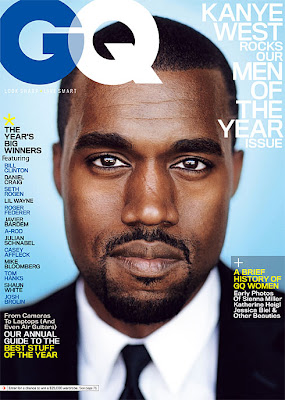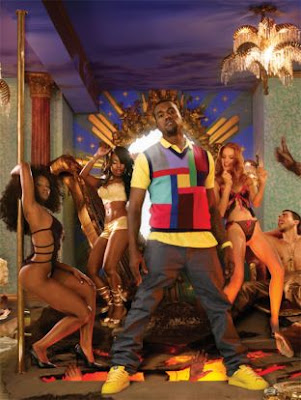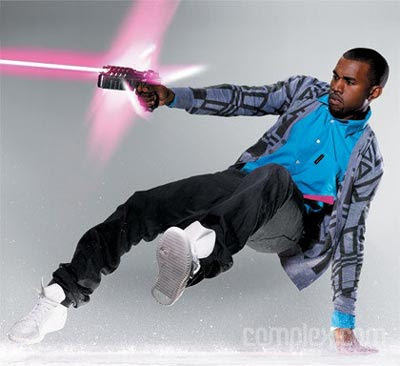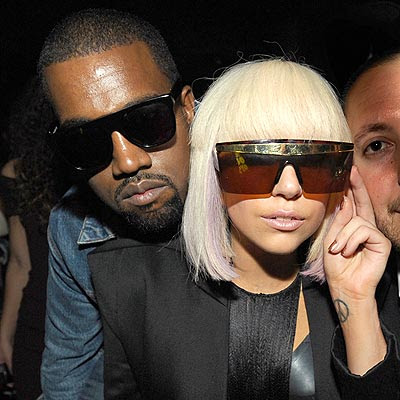






The first time Kanye West asked the folks at Roc-A-Fella records to let him rap, there was an uncomfortable silence. As a producer, West had churned out hits for Roc-A-Fella's intimidating trio of stars--Jay-Z, Cam'ron and Beanie Siegel--and earned praise for his great ear and tireless ethic. But in 2002 the idea that someone like West could be a successful rapper was faintly absurd. "Kanye wore a pink shirt with the collar sticking up and Gucci loafers," recalls Damon Dash, then Roc-A-Fella CEO. "It was obvious we were not from the same place or cut from the same cloth." Says Jay-Z: "We all grew up street guys who had to do whatever we had to do to get by. Then there's Kanye, who to my knowledge has never hustled a day in his life. I didn't see how it could work."
Roc-A-Fella wasn't the only label to pass on Kanye (pronounced Kahn-yay; it means "the Only One" in Swahili) West. Executives at record companies large and small failed to reconcile West's appearance and demeanor with their expectations of what a rapper should be. They had no idea how to market him. "It was a strike against me that I didn't wear baggy jeans and jerseys and that I never hustled, never sold drugs," says West, 28, who grew up in suburban Chicago and often dresses as if he's anticipating an acceptance letter from Exeter. "But for me to have the opportunity to stand in front of a bunch of executives and present myself, I had to hustle in my own way. I can't tell you how frustrating it was that they didn't get that. No joke--I'd leave meetings crying all the time."
When West finally got a deal (in the end, Roc-A-Fella overcame its institutional bias against Polo shirts), he shattered the myth that he was too soft, too weird and too bourgeois to fit the mold of a platinum-selling rapper. His 2004 debut album, The College Dropout, went nearly triple platinum, topped all the major critics' polls, earned 10 Grammy nominations and made rap accessible to audiences that hadn't paid attention in years. "That record restored my faith in hip-hop," says Jamie Foxx, who lent comic vocals to West's No. 1 hit Slow Jamz.
West is hardly the first person to bring a Buppie sensibility to rap. In the '80s, DJ Jazzy Jeff and the Fresh Prince, A Tribe Called Quest and LL Cool J successfully wove suburban perspectives into rebellious music, but when gangsta rap arrived, nuance was smothered by a blanket of extreme poses. Tupac Shakur, once a student at the Baltimore School for the Arts, died with THUG LIFE tattooed across his torso. On The College Dropout, West found a way to bridge the divide without self-destruction. His follow-up, Late Registration, arrives Aug. 30 and continues to mix race and class with beats and melodies. It is widely expected to be the biggest-selling record of the year--1.6 million copies will be shipped to stores for its first week of release.
The College Dropout was 76 minutes of someone cramming every thought he'd ever had about himself into rhyme. It was immaculately produced, but what made it compelling was the contradictions. The song Jesus Walks mixed spirituality with skepticism and rap with gospel. All Falls Down slammed the "single black female addicted to retail" but concluded with West admitting, "I wanna act ballerific, like it's all terrific/ I got a couple past due bills, I won't get specific/ I got a problem with spending before I get it/ We all self-conscious, I'm just the first to admit it." Throughout, West careered between the Protestant ethic and street fantasies, revealing himself to be wise and stupid, arrogant and insecure, often in the same breath. But by baring his flaws and being self-critical--and daring listeners to do the same--he created a fresh portrait of African-American middle-class angst, and you could dance to it.
It didn't take long for The College Dropout to develop coattails. Fashion-wise, you may have been blinded recently by the swarm of pink Polo shirts, while on the charts, West's friends John Legend, an R&B singer with a University of Pennsylvania degree, and Common, a whip-smart and austere Chicago rapper, both had sales spikes. West's Late Registration should push things further. "I didn't want to play it boring and safe," says West while sitting in the balcony of a 14th century church in Prague, one of the locations he hand-picked for the video of Diamonds from Sierra Leone, the Shirley Bassey-- based first single from Late Registration. "I also didn't want to innovate too much. Second albums, man, they're even scarier than first ones."
Musically, West took the extraordinary risk of fiddling with his sound by asking Jon Brion, known mostly for his collaborations with the talented but flaky Fiona Apple, to co-produce. Lyrically, he continues to stomp taboos and create a witty catalog of his schizophrenia. If that makes him sound like Eminem, it's worth noting that West is usually incorrigible like a puppy, not a pit bull. "His music is about being human," says West's obviously biased mother Donda, who recently retired from her post as chair of the English department at Chicago State University. "It's like Walt Whitman. 'Do I contradict myself? Very well, then I contradict myself. I am large, I contain multitudes.'" West's old boss, Damon Dash, puts it a little differently: "He combines the superficialness that the urban demographic needs with conscious rhymes for the kids with backpacks. It's brilliant business."
That the "urban demographic" needs "superficialness" could be read as two euphemisms away from racism. But Dash, an African American who thinks exclusively in shades of green, is merely letting the world in on what's accepted as social fact by much of the record industry. Hip-hop was born in the '70s as party music and evolved in the '80s into that rarest of pleasures--socially relevant party music. But in the mid-'90s, the genre came to be dominated by people like Snoop Dogg (sample track: Murder Was the Case), the Notorious B.I.G. (Ten Crack Commandments) and Jay-Z (Rap Game/ Crack Game)--excellent rappers with a shrewd eye for journalistic detail but, to put it bluntly, ex--drug dealers. "Rap changed a lot in the last few years," notes comedian and hip-hop fan Chris Rock, who says he listens to The College Dropout while he writes jokes. "In the early days, the best rappers weren't necessarily from the hood. Run-D.M.C. was from Hollis [Queens, N.Y.]. Eric B and Rakim were from Long Island. They lived next to the hood."
When the hard stuff sold well (hard stuff, in any medium, always does), the record labels, never bastions of original thought, asked for more. Soon rappers who had never got a speeding ticket were referring to themselves as pimps and hustlas, and what had started as ghetto reporting with a touch of caricature metastasized into caricature with no tether to reality. The result was a torrent of albums about the joys of acquisitiveness (bling, if you must), consequence-free violence and compliant women.
All that was complicated by--and you had to know it was coming--race. Statistics consistently show that 70% of hip-hop is consumed by young white audiences, but a century of anecdotal evidence is similarly irrefutable: white kids think it's cool to be black, which means the other 30% sets the trends and runs the show. With the market mired in thuggery, African-American consumers' could choose to: a) propagate a nasty stereotype of themselves for white kids to pin their libidinous fantasies on; b) not care; c) start patronizing the danger-free, supernice, superboring rappers at the liberal humanist fringe; or d) give up.
"I stopped listening to hip-hop 10 years ago," says Darryl McDaniels, the D.M.C. in Run-D.M.C. McDaniels points out that Run-D.M.C. rhymed about everything from materialism (My Adidas) and higher education ("I'm D.M.C. in the place to be/ I go to St. John's University") to Santa Claus (Christmas in Hollis). "We weren't choirboys, but we had multiple points of view. This past decade it seems like hip-hop has mostly been about parties and guns and women. That's fine if you're in a club, but from 9 a.m. till I went to bed at night, the music had nothing to say to me. So I listened to classic rock." What brought McDaniels back from his diet of John Mellencamp and Bob Seger was Jesus Walks. "When I heard it, I just stopped in my tracks," says McDaniels. "I thought, 'This song is about everything! This feels alive!'"
Jesus Walks is one of those miraculous songs that you hear for the first time and immediately look forward to hearing on a semiregular basis for the next 30 or 40 years. It's built on a booming gospel sample from the Arc Choir and one of West's typical contradictions, his admission that he's not particularly religious and his anger that songs with Jesus in the title don't get played on the radio. Che Smith, a friend of West's from Chicago who raps as Rhymefest, gave West the sample, wrote some of the first verse and receives half the song's royalties. "But Jesus Walks is all Kanye," says Smith. "When he wrote, 'To the hustlers, killers, murderers, drug dealers/ Even the strippers/ Jesus Walks for them!', I said, 'Wait, it doesn't matter what you do at all? You can keep doing bad things, and in the end it's all good? Don't we need to take a stand?' And he said, 'It's about imperfection. Everybody can relate to that.' Damn if he wasn't right."
West is sometimes credited with revolutionizing hip-hop, but this doesn't quite fit. Revolutions require moral certainty, and West's default position is doubt. What he's up to is more like a reformation. "I'm pretty calculating," he says, standing before the baroque altar of Prague's Church of St. Simon and Juda. "I take stuff that I know appeals to people's bad sides and match it up with stuff that appeals to their good sides." As an example, he cites a snippet of Diamonds from Sierra Leone about his rise to fame: "'Life movin' too fast, I need to slow down/ Girl ain't give me no ass, she need to go down.' All right, that's really crass, right? Really bogus. So what comes next? 'My father been said I need Jesus/ So he took me to church, let the water wash over my Caesar' [haircut]. I go back and forth all the time."
In music, West's juxtapositions make your head nod. In life, they can sometimes make it spin. "I came to Prague for this church," West says in the near whisper he uses when not standing in front of a microphone. "I scouted it, researched it. Ever since my accident"--in 2002 he crashed his car and cracked his jaw in three places--"I've had a thing about angels, and you can't get statues of angels or architecture like this in the States." One minute later, he stands in front of a video camera, sets his legs as if he's about to throw a punch, and barks, "'Sup, MTV. We in Pray-Goo for the Diamonds video!" Then West marches over to video director Hype Williams: "Those girls we saw at the club last night, we need them. The ones with the double Fs." Asked afterward which performance was more real, he looks hurt. "Both," he says.
Which brings us to race's kissing cousin: class. Communities that have been discriminated against are hardly free from prejudice. "Black people can be the most conservative, the most discriminating," says West. "Especially among ourselves. It wasn't white people who said all black men have to wear baggy jeans." Bougie is a common African-American term for middle class; it is not used kindly. West--who has a habit of beginning sentences with the preamble, "Rappers say this all the time," as if he were not one of the world's most popular rappers but a kid deconstructing one--is quite bougie.
Raised in the Chicago neighborhood of South Shore by his mother (his parents divorced when he was 3, and he spent summers with his father Ray, a former Black Panther who is now a Christian marriage counselor), West went to good schools, received art and music lessons and, when he was 10, spent a year in Nanjing, China, where his mother was a visiting professor. Like many suburban kids, he developed a passion for hip-hop that was only enhanced by his awareness that the genre often romanticized bad behavior. His mother did not exactly approve; when West went to concerts, even in his late teens, she often followed. "He maybe doesn't know this," says Donda West, "but I was at a lot of those shows, watching him."
Early on, West knew he wanted to be a rapper; at 13 he made an amateur recording about green eggs and ham. But his parents had other ideas. "My plan was that he would get at least one degree, if not several," says his mom, the Ph.D. After Kanye graduated from high school in 1995, he enrolled in art school and took an English class for a year at Chicago State before finally confronting his parents. After months of lengthy conversations, West persuaded them to let him try rapping and producing for a year. Recalls Donda: "He said, 'Mom, I can do this, and I don't need to go to college because I've had a professor in the house with me my whole life.' I'm thinking, This boy is at it again. He always could twirl a word."
During the day, West worked as a telemarketer to pay the $200 a month his mother demanded in rent. At night he honed his delivery and made beats for other rappers. Within a few months he had his first major sale--$8,000 from a Chicago rapper named Gravity. "That's when I knew the one-year plan was out the window," says West. Soon he was making beats for Bad Boy Records' rapper Mase, and in 2001 West produced several tracks for Jay-Z's groundbreaking album The Blueprint, using samples of old songs (the Doors' Five to One, the Jackson 5's I Want You Back) sped up until they sounded like Chipmunks cover versions. (West admits he took the idea from the Wu-Tang Clan's The RZA; he insists on giving credit where it's due.) Still, he couldn't persuade Jay-Z, Damon Dash or anyone else to take him seriously as a rapper.
In October 2002, West, exhausted from hours spent in a recording studio, fell asleep behind the wheel of his Lexus and nearly died. "He called me from his hospital bed with his jaw wired shut and asked for a drum machine," says Dash. "That impressed me." Three weeks after the accident, with his jaw still shut, West went to a studio and mumbled Through the Wire, a song about the crash built on the accelerated chorus of Chaka Khan's Through the Fire. It was dramatic and funny ("I drink a Boost for breakfast, a Ensure for dizzert/ Somebody ordered pancakes, I just sip the sizzurp"), and it finally persuaded Roc-A-Fella to move ahead with a Kanye West album. "Death," says West, "is the best thing that can ever happen to a rapper. Almost dying isn't bad either."
In its first week of release, The College Dropout sold 441,000 copies--an extraordinary number for a debut--and entered Billboard's album chart at No. 2, behind velvet colossus Norah Jones. Immediately West started grumbling about disrespect. He complained about ambivalent words in glowing reviews, whined to his label about a lack of promotion, suggested that magazines pay to put him on their cover (in case you're wondering: uh, no) and, most famously, walked out of the American Music Awards when he lost Best New Artist to country singer Gretchen Wilson ("I was the best new artist this year, so get that other bull____ out of here"), a gesture made even more obnoxious by the fact that Wilson was as much a rebel in her field as West was in his (see page 66). In all, he acted with the maturity and grace traditionally associated with rap stars.
Like most people who've ever stared into a camera lens or picked up a microphone, West is better at integrating his flaws into his art than into his personality. As he says on the new song Touch the Sky, "I'm trying to right my wrongs/ But it's funny the same wrongs help me write this song." Still, his behavior during awards season was reminiscent of the video-set collision between church architecture and large breasts. It seemed a little forced. "He's trying to change this genre, and in order to do that he's got to get people to listen to his music," says a fervent McDaniels. "They've gotten so used to hardness, to stupidity, that if he has to engage in a little of that to be relevant, so be it."
West won't cop to exaggerating his petulance. "I was just trying to create some entertainment," he says, adding that his act will probably tone down in the future because "people mature" and "I have a lot more to lose." In another context he admits to a contradiction truly worthy of him: in his attempt to shatter the rapper stereotype, he's sometimes willing to behave stereotypically. "Take the word nigga," West says. "I don't like the word, and I made an attempt to change it on this new song Crack Music"--an indictment of drug abuse. "I tried saying, 'This is crack music, homey,' but it just didn't have the same impact. My mom's a teacher, and I'm kind of a teacher too. But the hood, the suburbs, MTV and BET are my classrooms, and I know how to talk to my class." The word nigga appears multiple times on the album.
On Late Registration, the syllabus returns to Whitman's Song of Myself. There are skits ridiculing the impoverished members of a made-up black fraternity (Broke Phi Broke), while the song Gold Digger pleads with women to stand by working-class men because "He got that ambition baby look at his eyes/ This week he mopping floors next week it's the fries."
Contradictions abound on the CD, but what you notice most is the music. West is a master of samples and drum loops, and co-producer Brion can play anything with strings. Together they make one of the better-sounding rap records in history. Diamonds from Sierra Leone features the Bassey sample, keyboards stolen from a Vegas lounge act and a horn section fit for a coronation. Gone opens with an Otis Redding sample (from It's Too Late) and a two-note piano melody. Then there's a thwack of percussion and what seems like eight different string sections playing disciplined countermelodies that change with each verse to modify the vocals. In the middle it slows to a crawl for a few seconds, just because. At the end, West is justified in boasting, "Maybe you can be my intern and intern/ I show you how to cook up summer/ In the winter."
One night while making the record, Brion says, he and West got in a state of giddy exhaustion unique to people who spend hours a day for months on end in a windowless recording studio. "We had just been talking about something, and there was one of those weird, intense lulls," says Brion. "Kanye looks at me, and he goes, 'You know that saying You can't be all things to all people? Well, seriously, why not? I want to be all things to all people.'" Brion waited for a moment, then burst into laughter. "I knew he wasn't kidding, and he's smart enough to know that wanting to be loved by everybody is probably really bad for your mental health, but at the same time his point was, you know, why not try?" You never know. He just might succeed.
No comments:
Post a Comment